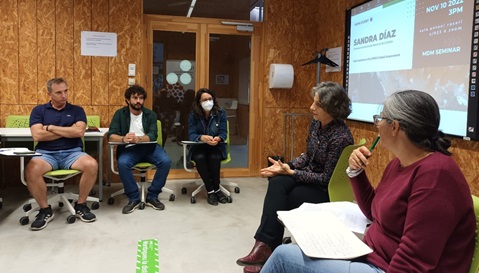ICTA-UAB Celebrates 'Nobel Prize for the Environment' Winners Sandra Díaz and Eduardo Brondízio
Argentinian ecologist Sandra Díaz and Brazilian-American anthropologist Eduardo Brondízio are being awarded the 2025 Tyler Prize for Environmental Achievement for their extraordinary work linking biodiversity to humankind, the Tyler Prize Executive Committee announced.

The prize recognizes their pioneering scientific studies on the interconnections between biodiversity, climate change, and human societies as fundamental to shaping effective global environmental decision-making.
This recognition is particularly significant for the research community at ICTA-UAB, where researchers such as Victoria Reyes-García and Álvaro Fernández Llamazares are deeply engaged in studying local and Indigenous environmental knowledge. Both have close professional and personal relationships with the awardees, making the news of the prize a moment of joy and pride for our research institute. We have been honoured to host seminars by both Díaz and Brondízio at ICTA-UAB, as part of our María de Maeztu talk series.
Álvaro Fernández-Llamazares, who has a long legacy of research collaboration with both awardees, states “I cannot think of any other environmental scientist more deserving of this prize than Sandra and Eduardo. Both are trail-blazing scholars who have pushed the boundaries of our scientific knowledge on human-nature inter-relationships, but also visionary leaders who have contributed enormously to inform global policy discussions around the future of our planet. Their high-caliber work represents an extraordinary tour de force at the intersection between great scholarship and evidence-based policy development, situating them at the cutting edge of the transdisciplinary social-ecological sciences”.
Brondízio was one of the academic mentors of Fernández-Llamazares during his postdoctoral research. He was invited to conduct a three-month research stay with Brondízio at Indiana University Bloomington, in the United States. Some of their research together has included an analysis of deforestation patterns across the Amazon Basin, and several studies on the roles of Indigenous Peoples in global biodiversity maintenance. Both are members of the Scientific Committee of UNESCO’s Amazon Biosphere Reserves Project.
With Sandra Díaz, his collaboration emerged in the context of the Intergovernmental Science-Policy Platform on Biodiversity and Ecosystem Services (IPBES). They have co-authored several papers reviewing the approach of IPBES for synthesizing evidence across knowledge systems, and a forthcoming study looking at human-nature relationships through the lens of reciprocity, which will soon be published in a dedicated Special Feature in the journal People and Nature.
Victoria Reyes-García, who has also collaborated with both awardees within the framework of the IPBES Global Assessment, highlights that this prize "recognizes a paradigm shift in conservation and in our way of understanding the relationship between humans and nature. By honoring the work of two great scientists, it acknowledges their efforts to make visible the importance of integrating our interactions with nature rather than considering it as something separate. This recognition, due to the transformative impact it represents, is a benefit for both nature and society."
In her collaborations with Brondízio, Reyes has worked on analyzing the role of Indigenous peoples and local communities in biodiversity conservation, recognizing their rights and highlighting their crucial role in the sustainable management of ecosystems.
With Sandra Díaz, her current collaboration focuses on the study of Cultural Keystone Species, developing a conceptual framework that integrates social and cultural aspects to assess the vulnerability of key species in diverse communities.
Díaz and Brondízio are using the win to draw attention to humanity’s "entanglement" with nature, issuing a joint call for policies, business models, and individuals to acknowledge their dependence and shared responsibility in the "fabric of life."
The Tyler Prize Executive Committee awarded the USD $250,000 Prize to Díaz and Brondízio for their "commitment to understanding and addressing biodiversity loss and its impact on human societies."
The first individuals from South America to receive the Tyler Prize, Díaz and Brondízio worked together (with co-chair Josef Settele) on the Global Assessment Report of the Intergovernmental Science Policy Platform on Biodiversity and Ecosystems Services (IPBES), released in 2019, as well as the United Nations’ Convention on Biodiversity.
This prize marks a milestone in ongoing efforts to integrate biodiversity conservation with social equity and economic sustainability, ensuring that environmental policies worldwide recognize and support the interdependence of human and natural systems.